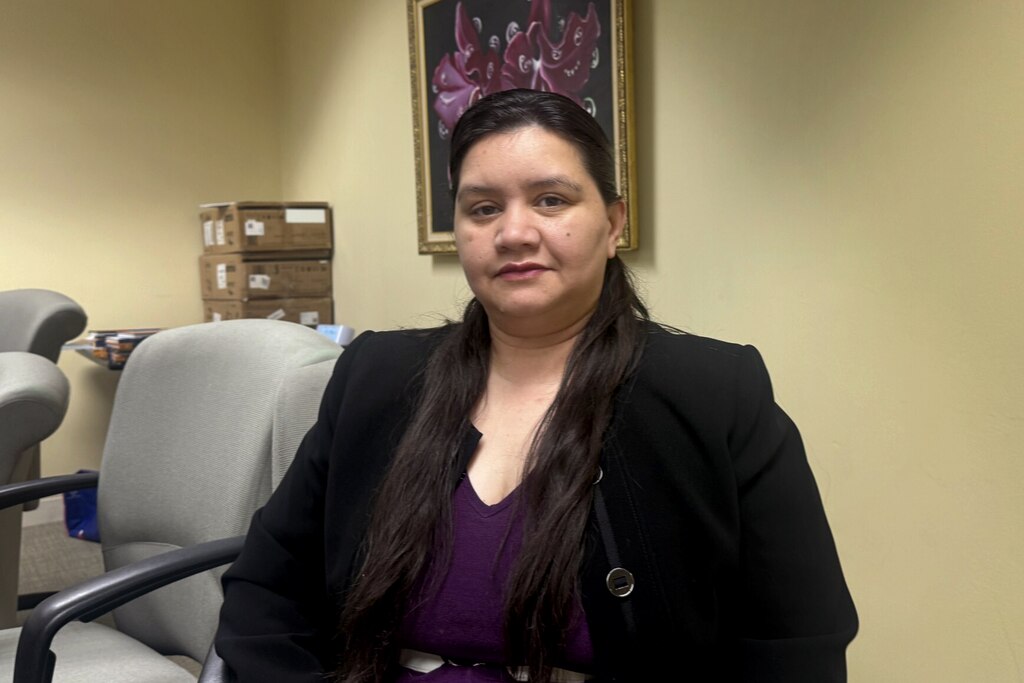Aldair Campos is unapologetic in his support for Kilmar Abrego Garcia, the Beltsville father who was mistakenly deported by the Trump administration to his native El Salvador.
“Kilmar could have been anybody,” said Campos, a first-generation Salvadoran American and a Gaithersburg-based paralegal in an immigration law firm where 80% of the clients are Salvadoran. “He could have been any one of our clients.”
In addition to capturing the nation’s attention, Abrego Garcia’s case has roiled Maryland’s Salvadoran population, which is one of the largest immigrant groups in the state.
They have an unusually personal connection to a case that has called into question how the U.S. complies with due process amid the ramped-up immigration enforcement efforts under the Trump administration. The imbroglio is also giving some in the expat community a chance to reflect on life in the U.S. as well as in their native El Salvador, now led by the President Nayib Bukele, who has become a major player in the tug-of-war over the deported Maryland father.
The Baltimore Banner thanks its sponsors. Become one.
Prince George’s County, where Abrego Garcia lived, has the second-largest concentration of immigrants in the state, at 22.5%. Immigrants from El Salvador represent 11.7% of all immigrants in Maryland, according to the 2024 Office of the Comptroller’s State of the Economy Report.
Read More
The Salvadoran population experienced significant growth in the Maryland suburbs of Washington, D.C., between the 1980s and 2000, flocking to the region in large measure after civil strife at home.
Many Salvadorans in Maryland work in grounds-cleaning, building maintenance, food preparation and construction, according to George Mason University’s Institute for Immigration Research.
Abrego Garcia lived in Beltsville, on the outskirts of the College Park-Langley Park area in Prince George’s County. Salvadoran families made up 44% of the county’s Hispanic population, according to a 2022 county survey.
In the heart of it all are the pupuserias, bakeries and barber shops on the “El Salvador Corridor,” a stretch lined with small businesses on MD-193 between New Hampshire Avenue and West Park Drive.
The Baltimore Banner thanks its sponsors. Become one.
The Abrego Garcia controversy has also resonated in the business community, with some who support Bukele and cite his work to improve tourism and safety.
Juan Umanzor, president of the Salvadoran American Chamber of Commerce, said Bukele has El Salvador headed in the right direction, adding that the leader has already done “extremely well.” Umanzor said the country is no longer considered one of the most dangerous countries in the world and now it’s one of the safest.
“It’s a lot of hard work. Rome wasn’t built overnight,” said Umanzor, who attended Bukele’s inauguration in 2024. “I have to give credit to the man. ... He’s taken the country in a good direction. Is he perfect? No, he is not.”
When it comes to Abrego Garcia, Umanzor said the Beltsville resident must be returned to his family in Maryland.
“He’s not a gang member. He’s a father, husband and community member. His rights and humanity must be protected regardless of his status. They called it an error — that’s not enough. Justice demands restitution,” he said.
The Baltimore Banner thanks its sponsors. Become one.
Umanzor said he planned to send Maryland Gov. Wes Moore, a Democrat, a letter asking for Moore to speak out in support of Abrego Garcia.
Bukele is extremely popular in El Salvador, winning his second term with 80% of the vote last year, which required a new interpretation of the country’s constitution to allow a second term. He has significantly lowered violent crime there. He has also grown close to President Donald Trump, whose administration has confirmed paying millions to detain prisoners in El Salvador.
Bukele has also drawn the ire of human rights groups, who have alleged torture with severe beatings amid brutal conditions.
 El Salvador's President Nayib Bukele and first lady Gabriela Roberta Rodríguez wave from a balcony after he was sworn in for a second term in San Salvador, El Salvador, in 2024.
El Salvador's President Nayib Bukele and first lady Gabriela Roberta Rodríguez wave from a balcony after he was sworn in for a second term in San Salvador, El Salvador, in 2024.When it comes to Bukele, Campos, the Salvadoran paralegal, called the president a “fascist,” citing his alleged suppression of the press and other free expression. The 27-year-old said there is only an illusion of safety in El Salvador.
“Of course, businesses owners will be happy with an increase in tourism. But what about the living wages for their employees?” Campos said. “It’s not moving in the right direction for poor people. It’s moving in the right direction for wealthy people.”
The Baltimore Banner thanks its sponsors. Become one.
Alfredo Medina Moreno said he moved to the U.S. eight years ago after his parents died. His siblings, who had already left El Salvador, helped him secure a green card, which allowed him to apply for citizenship in 2023, he said. He now lives in Silver Spring in Montgomery County, which is also home to a large Latino population.
Medina Moreno said he is not happy with how El Salvador has responded to Abrego Garcia. He said he voted for Bukele in the first election because he knew the president’s father, Armando Bukele Kattán, as someone who was democratic and fair. But Medina Moreno said he now worries that Bukele is too focused on the country’s reputation over improving conditions for people in El Salvador.
Still Medina Moreno, a former television reporter who now works in an immigration law office, plans is to move back to El Salvador in the next few years. He had always intended to stay for a while in the U.S. to save money, secure American citizenship, then go back to buy a house and open a small business in his home country.
 Freesi Bonilla spent her formative years in Montgomery County, then settled with her husband and children in Prince George’s County.
Freesi Bonilla spent her formative years in Montgomery County, then settled with her husband and children in Prince George’s County.When Freesi Bonilla, 37, thinks of her native El Salvador, she remembers the freedom she felt as a young girl. She roamed the neighborhood and ran on the dusty, unpaved roads. She climbed fruit trees, picking mangos.
But she said she would never go back. She spent her formative years in Montgomery County, then settled with her husband and children in Prince George’s County, where she works now as the chief program officer for Centro de Apoyo Familiar, a nonprofit organization in Riverdale that provides housing counseling services.
The Baltimore Banner thanks its sponsors. Become one.
This is her country, Bonilla said. It was a lack of job opportunities and a child with medical needs that drove her father to emigrate to the U.S. in 1984. Bonilla, her older brother and her mom later followed when Bonilla was 7.
She said her family watched from afar as their homeland spiraled with gang violence. Then she heard of the crackdown on crime. People came back from visits, she said, with a renewed outlook on El Salvador‘s improved safety.
But when it comes to how El Salvador is now responding to U.S. immigration politics and practices, she said, Bukele has been too complicit in aiding the Trump administration at the expense of human rights.
Bonilla’s organization works with faith-based community leaders. As part of those efforts, Bonilla said, she has heard about worried immigrants with lots of questions about the laws and regulations that govern deportations. Her organization, she said, has been working with immigration attorneys to help educate Salvadoran community members about their rights.
She has also told her fellow immigrants to try not to worry too much despite the new crackdown by the Trump administration on undocumented immigrants.
“Because that’s exactly what the government wants you to do,” she said. “Fear.”



Comments
Welcome to The Banner's subscriber-only commenting community. Please review our community guidelines.